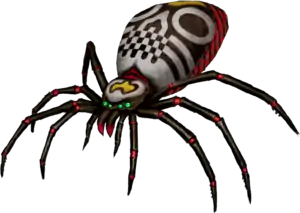Skulltula (5e Creature)
Skulltula
|
Medium beast, unaligned Armor Class 15 (natural armor)
Skills Perception +3, Stealth +3 Spider Climb. The skulltula can climb difficult surfaces, including upside down on ceilings, without needing to make an ability check. Web Descent. When climbing on a ceiling, the skulltula can spin rope-like webbing and use it to descend from the ceiling as part of using its climb speed. It can use its climb speed to ascend this rope-like webbing it creates as easily. This webbing otherwise has the same statistics as those in the Web action, below. Web Walker. The skulltula ignores movement restrictions caused by webbing. ACTIONSBite. Melee Weapon Attack: +3 to hit, reach 5 ft., one target. Hit: 4 (1d6 + 1) piercing damage plus 3 (1d6) poison damage. Slam. Melee Weapon Attack: +3 to hit, reach 5 ft., one target. Hit: 5 (1d8 + 1) bludgeoning damage. If the target is a Medium or smaller creature, it must succeed on a DC 11 Strength saving throw or be knocked prone. Web (Recharge 5-6). Ranged Weapon Attack: +3 to hit, range 30/60 ft., one creature. Hit: The target is restrained by webbing. As an action, the restrained target can make a DC 11 Strength check, bursting the webbing on a success. The webbing can also be attacked and destroyed (AC 10; hp 5; vulnerability to fire damage; immunity to bludgeoning, poison, and psychic damage).
|
A typical skulltula is a spider-like, eight-legged monstrosity that is the size of an adult hylian. Its hardened, armor-like carapace bears a striking resemblance to a large humanoid skull, hence the origin of the creature's name. Although these creatures can lay webbing traps like more mundane spiders, more often than not they actively hunt their prey. They are unusually skilled at melee combat, and some have even been known to block sword strikes. These monsters have been known to attack with bites, slams, webbing, and even kicks. Skulltulas usually dwell in areas of darkness, most commonly including caverns and forest depths. Small, young skulltulas are most often referred to as walltulas, and have fewer capabilities compared to their elders. If an area has even one skulltula or walltulla, there are usually a dozen or more hiding in the darkness nearby. |
Variant: Big Skulltula
Uncommonly, a thriving skulltula can grow to exceptional size. It has the following attribute changes:
- This variant is Large
- Has four more Hit Dice, which increases its average hit points to 55.
- Slam. Melee Weapon Attack: +3 to hit, reach 10 ft., one target. Hit: 10 (2d8 + 1) bludgeoning damage. If the target is a Large or smaller creature, it must succeed on a DC 13 Strength saving throw or be knocked prone.
- This variant has a Challenge Rating of 1 (200 XP).
.png.webp) |
|---|
| Source |
See also
- Walltula, a younger and smaller skulltula
- Tektite, another common monster that resembles arachnids
- Armogohma, a Gargantuan spider-like monster that resembles some varieties of skulltula
Back to Main Page → 5e Homebrew → 5e Creatures
Back to Main Page → 5e Homebrew → Campaign Settings → Hyrule→ Bestiary


